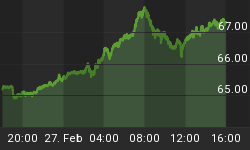
In Frédéric Bastiat's 1850 essay Ce qu'on voit et ce qu'on ne voit pas, the famous economist introduced the parable of the broken window. He illustrated the principle that intentionally breaking a window just so that someone can subsequently fix it did not actually represent an increase in the net wealth of an economy. Today we will examine a similarly misguided fallacy that has been the foundation of an equally disastrous pattern of economic policy. We will call this the fallacy of the debased currency.
It is accepted by the vast majority of economists and, more importantly, politicians that currency debasement is a desirable weapon to be used to combat recessions. In the last few years printing money for deficit financing has become normal in Europe and America. Moreover, many take the view that currency debasement can serve as a means of increasing exports. In the past year the Swiss and Japanese have intervened to weaken their currencies as they rose in response to US dollar and euro weakness. This was done in order to promote exports. And while the Federal Reserve and European Central Bank have been less explicit in linking money printing to boosting exports, they are just as eager to reap the same supposed gains. President Obama's 2010 State of the Union pledge to double exports in five-years, QE1, QE2, Operation Twist Part 1, Operation Twist Part 2, and a perpetual zero-interest rate policy are not unconnected.
Governments and central banks globally believe that if their currency is too strong it will hurt exports. The easy solution is to debase the currency and watch the problem self-correct. However this line of thinking misunderstands the relationship between a currency and the underlying economy. The currency is a reflection of the strength of an economy. As an economy becomes more productive and produces goods that its trading partners want, the demand for that currency increases.
Imagine two simple economies. The Land of Arcadia has 100 apples while the Village of Keynes has 100 oranges. We will assume that the citizens of both towns are indifferent to either fruit and simply seek to maximize the total amount (a citizen from either would prefer two apples to one orange or alternatively two oranges to one apple). This also means that the trade value of one apple is equal to the trade value of one orange. Each economy has 100 units of its own paper currency that are backed by individual pieces of fruit. Therefore one apple costs "one Arcadian Note" while each orange cost "one Keynes Note".
One day the emperor of the Village of Keynes decides that it wants to increase exports and in order to do so it prints another 100 Keynes Notes. Think about the mechanics of what actually happens. There are 200 Keynes Notes in circulation but still only 100 oranges. There is additional currency chasing the same underlying basket of production. This naturally bids up the price of oranges to two Keynes Notes each. But consider the perspective of the Arcadians. Despite the currency machinations, the Arcadians are still willing to trade one apple for one orange. So now a one Arcadian Note apple is equivalent to a two Keynes note orange.
Now consider the way the export data would be reported if the villages used our current system of nominal export values. The trade of an apple for an orange is unchanged, yet because nominal prices have risen in the Land of Keynes the emperor would report that exports have doubled. In nominal Keynes Notes they have increased exports by 100% without ever changing the underlying transaction. However, from the perspective of a citizen in the Land of Keynes import prices have also risen as it now costs two Keynes notes to buy an Arcadian apple.
If the newly printed currency was distributed equally then the problems might be somewhat limited. But consider the actual mechanics of a central bank bond purchase. The central bank uses the new money to purchase the bond from the balance sheet of a commercial bank. That means that the banks have the first shot at the distribution of this new money, and as one might guess it is not distributed evenly to the population. While nominal wages will rise, the government and the banking sectors are the only ones who derive a purchasing power increase from the new money, as they are the first receivers of the new currency.
Alternatively, if the Village of Keynes leaves the price of an orange at one Keynes Note then demand for oranges will increase. Remember the Arcadians are still wiling to give one apple for one orange. But because the supply of Keynes Notes has doubled each note is now worth less. If the Arcadians are going to accept Keynes paper then they will want two Keynes Notes for one apple. If the Keynesians continue to sell their oranges for only one Keynes Note then they have effectively put their goods on sale at half price. We know this because one Keynes Note now only buys half an apple.
The takeaway is that if it sounds silly or absurd to hear governments and central banks talk about debasing the currency in order to drive exports or boost growth that's because it is. One of the exciting facets of economics is that it is a logical science that follows with logical arguments and assumptions. When in doubt, think about what you know and what makes sense based on what you believe as opposed to following the logic of someone who has fallen victim of the parable of the debased currency.















